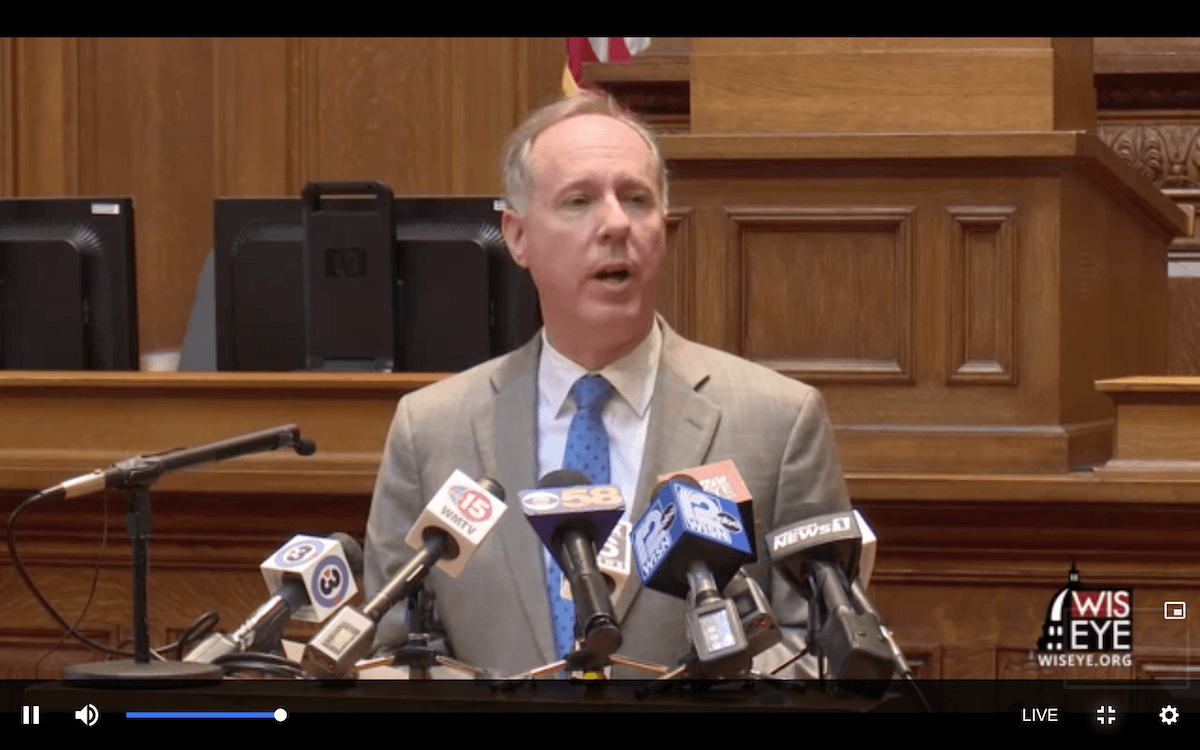
#image_title
A public hearing is scheduled for 11 a.m. Tuesday at the Capitol, less than 24 hours after Republican bill was introduced.
Hours after Democratic Gov. Tony Evers made a push for lawmakers to get to work and pass his COVID-19 relief bill and Assembly Democrats introduced a separate version of their own, Wisconsin Republicans unveiled their own COVID-19 package—all on the first day of the new legislative session.
With Republicans in control of the Legislature, the GOP bill is on the fast track. A public hearing is scheduled for 11 a.m., Tuesday, in Room 412 East of the Capitol. This is less than 24 hours after Assembly Speaker Robin Vos (R-Rochester) announced the bill would be released during the legislative swearing-in ceremony Monday afternoon. Vos said the Assembly will convene to vote on the bill Thursday.
“Let’s join together to get this bill passed this week to give Wisconsinites the help they need,” Vos told Republican members of the Assembly. Democratic members were not present, having been sworn in virtually last week. The decision was due to lax COVID-19 precautions in the chamber.
“While it was very disappointing the governor walked away from the negotiating table last month, I want to thank our colleagues in the State Senate who continued our negotiations. We have a final bill that has been agreed to in both chambers,” Vos said. “This bill contains many provisions from our bipartisan discussions.”
While Vos stated that the bill contained bipartisan provisions, Assembly Democrats disagreed.
Assembly Minority Leader Gordon Hintz (D-Oshkosh) released a statement calling the bill divisive and voicing his frustration that the Republican leadership, “prioritizes the wishes of their special interest backers over the public health needs and economic challenges of Wisconsinites.”
“I’m proud that Democrats in the legislature introduced a comprehensive COVID-19 response bill first thing this morning that focuses on the health and safety of Wisconsinites and provides relief to help our neighbors who are struggling due to the pandemic,” Hintz stated. “We should show the people of Wisconsin that we hear them by focusing on individuals, families and small businesses, not special interests.”
Vos also made the case that the reaction by the government to the coronavirus had ruined the livelihoods of “far too many of our friends and acquaintances. He also presumably took aim at Andrea Palm, secretary designee of the state Department of Health Services, for orders she is legally able to pass during a public health emergency.
“Our constitution can never be placed on hold, even during times of a public health emergency,” said Vos. “We can’t allow an unelected bureaucrat to rule over communities like a dictator, picking and choosing what businesses should fail or forcing schools to be virtual.”
While some of the poison pills in Republicans’ original COVID-19 package are not in the latest version, there are quite a few things Democrats want that are not there and others Democrats are sure to object to.
One the big areas of contention will be over legal immunity for entities that could be held liable for someone contracting COVID-19. This protection extends to governments, businesses, schools, nonprofits, any organization or entity where an employee, contractor or client may have contracted COVID-19.
That provision states that, “immunity does not apply if the act or omission involves reckless or wanton conduct or intentional misconduct,” but does not clarify what constitutes reckless or wanton conduct or intentional misconduct. It does, however, state that not observing public health regulations does not count.
“The bill provides that an entity’s noncompliance with any national, state, or local order requiring entities to close or limit capacity does not constitute reckless or wanton conduct or intentional misconduct for purposes of immunity under the bill,” it reads.
Employers would not be able to require their employees to be vaccinated for COVID-19 nor would public health officers, who currently have the power to require individuals to be vaccinated. Public health officers would not be able to close to restrict businesses for more than 14 days unless the governing body they report to grants them an extension, which would only be for another 14 days. Religious gatherings would be exempt from any public health restrictions.
Also, under the bill the Joint Finance Committee would have authority over how federal COVID-19 funds are allocated. For any funds received between passing of the bill and June 30, the governor would need to submit an expenditure plan for passive review.
The state capitol would have to re-open and employees would have to return to work in-person by Jan. 31.
The provision requiring schools to return to in-person instruction is no longer in place, nor the rebate to parents of students who spend half the 2020-21 school year studying virtually.
But one unpopular provision they kept would require school boards to have two-thirds approval to implement virtual instruction and even then it could only be implemented for 14 days. School districts would also be required to submit reports to the Department of Public Instruction on virtual instruction and any reductions or increases in expenditures due to virtual instruction. Another would loosen restrictions on open enrollment during the school year, allowing students to transfer schools at any time.
On unemployment insurance, the Department of Workforce Development would need to submit a plan within 30 days of the package passing on how it plans to address the remaining unemployment insurance backlog. Call center hours would be extended to 12 hours a day, seven days a week. The one-week waiting period for collecting benefits, which has been waived since March, would continue to be waived through March 14.
Jessica VanEgeren contributed to this report.

This billionaire’s PAC is spreading a big lie about Tammy Baldwin, Medicare, and taxpayer savings
Restoration PAC, funded by Uline’s Richard Uihlein, twists the significance of forcing Big Pharma to negotiate for lower bulk pricing on Medicare...

New Biden rules deliver automatic cash refunds for canceled flights, ban surprise fees
In the aftermath of a canceled or delayed flight, there’s nothing less appealing than spending hours on the phone waiting to speak with an airline...

Opinion: It’s time for Congress to fight for small businesses instead of big corporations
May is National Small Business Month. Our elected leaders need to show leadership all year long. For the past 27 years I’ve been fortunate to pursue...

Biden makes 4 million more workers eligible for overtime pay
The Biden administration announced a new rule Tuesday to expand overtime pay for around 4 million lower-paid salaried employees nationwide. The...




